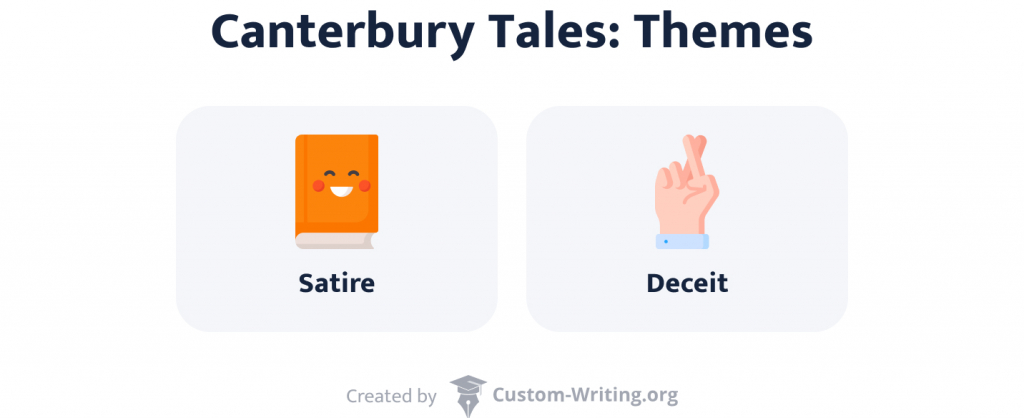The Canterbury Tales by Geoffrey Chaucer is an outstanding piece of English literature. It impresses readers with a wide range of themes that play a crucial role in understanding the book’s entire concept. Are you looking for the analysis of The Canterbury Tales themes? Explore the following article and dive deep into the book’s ideology.

Satire
The theme of satire in The Canterbury Tales reflects the author’s key aim: to criticize society’s ills. The historical context plays an essential role in the comprehension of the stories. So, let’s first analyze the social background of Geoffrey Chaucer’s time.
Originally, Medieval England was divided into three estates:
- those who pray – Church;
- those who fight – Nobility;
- those who work – Peasantry.
Nonetheless, by the end of the 14th century, the strictly organized medieval estates started their collapse. Secularism became a common thing in society, providing a ground for developing a new social class. It consisted of merchants and intelligence who were rapidly gaining power and money.
Being a son of wine merchants, Geoffrey Chaucer belonged to this middle class himself. Thus, he knew all the details and managed to present the drawbacks in the most caustic manner.
The entire piece of literature, especially the general prologue, is saturated with the estates’ satire. Due to the underdeveloped framework of social classes, the reality doesn’t correspond to the expectations. Thus, Chaucer describes the greedy Pardoner, the unethical Friar, the buried in debt Merchant, etc. The people who are supposed to lead a monastic lifestyle are immoral. The pilgrims, whose occupation requires honesty, are corrupted. Using social satire, the author skewers the archetype of every single group.
One of the brightest satire examples is Miller’s behavior. He is supposed to provide people with flour, which is necessary for making bakery products. However, he is stealing the crops from the farm or charges three times more.
Another illustration of the estate satire in the book is the Pardoner. His mission is to forgive people’s sins by selling indulgences. So, he is supposed to be honest, empathetic, and highly moral. Nevertheless, to gain more money, he intentionally convinces people of their sinfulness. Thus, the Pardoner is greedy, even though he has to be a humble church worker.
SImilarly to the Pardoner, the satire of the Friar reflects the weakness of the religious class. He lives in luxury, seduces women, and acts immorally as for the church servant.
Besides the character’s descriptions, the pilgrims’ tales also criticize the social classes utilizing sharp humor. For instance, The Nun’s Priest Tale about the fox and the rooster reflects the opposition of the Nobility and the Peasants in real life. Hence, Chaucer highlights that the contradiction between the classes is the cause of social inequality.
Chaucer also introduces positive representatives of social classes. They are the noble Knight, the hospitable Franklin, and the religious Prioress. Yet, the exemplary archetypes are in the minority. The negative characters dominate. This makes The Canterbury Tales a unique book full of estate satire.
Satire Quotes
A Friar there was, a wanton one and merry,
The Canterbury Tales, Narrator, The General Prologue
A Limiter, a very jovial man.
[…]
Full sweetly he would hear confessions,
And very pleasant were his absolutions.
He was an easy man at granting penance
From which he made more than a pittance.
[…]
His income was far greater than his rent,
And he romped around, like any whelp.
Women desire the self-same sovereignty
The Canterbury Tales, Knight, The Wife of Bath’s Tale
Over a husband as they do a lover,
And to hold mastery, he not above her.
But briefly my intent I here confess:
The Canterbury Tales, Pardoner, The Pardoner’s Prologue
I preach, but only out of covetousness.
Therefore my theme is now, and ever was:
“Radix malorum est cupiditas.”
Thus do I preach against the very vice
I too indulge in, which is avarice.
Though I myself am guilty of that sin,
Yet I have power these other folk to win
From avarice, and bitterly to repent.
Yet that is not my principal intent;
I preach only out of covetousness.
A Merchant was there, with a forked beard,
The Canterbury Tales, Narrator, The General Prologue
Dressed in motley, high on horse he sat.
[…]
He could exchange monies, buy and sell.
This worthy man made such use of his wits;
No one knew he was beset by debts,
So stately his manner of behaving,
In his bargaining, and money-lending.
Truly a worthy man then, all in all,
But truth to tell, I know not what he’s called.
A black-tipped fox of sly iniquity,
The Canterbury Tales, Nun’s Priest, The Nun’s Priest’s Tale
Who in the grove had lived years three,
With premeditated scheming, at a stroke,
That same night through hedge and fences broke,
Into the yard, where Chanticleer the fair
Was wont and his wives too, to repair;
And in a bed of green-stuff still he lay
Till it was near the middle of the day,
Waiting the time for Chanticleer to fall,
As are wont to do these homicides all
That lie in wait to slay innocent men.
Deceit
Deceit is one of the most critical Canterbury Tales themes. Lie and dishonesty appear in the general prologue and continue their development throughout the entire book.
The core concept of The Canterbury Tales is tale-telling. Thus, the readers and the pilgrims do not witness the events themselves. They only rely on the narrator’s stories that are frequently too exaggerated. Thus, even the initial idea of the book indicates a deceit vibe.
In The Canterbury Tales, the lie occurs in the pilgrims’ behavior and their tales. The narrator even highlights the shady nature of some travelers in the prologue. For example, Chaucer introduces the Shipman with criminalistic background, greedy and corrupted church workers, etc. The narrator tells about the Merchant who pretends to be rich but has numerous money debts. He also describes the Prioress, who is trying to look dainty, but she is very bulky. The list of the insincere characters is too long. But the key idea is obvious: the majority of the pilgrims pretend to be someone they not really are.
The stories that the travelers share are deceitful as well. The lie is the core element of The Miller’s and The Reeve’s Tales. The brutal Miller tells the flighty story where betrayal and cheating are the leading themes. Here, the woman conspires with her lover, tricks her husband, and commits adultery.
The Reeve’s Tale is also based on mistrust. The main character of the story, Miller regularly steals the corn. This leads to a sequence of misunderstandings and ends up dramatically. The Reeve’s Tale reflects his behavior. He is a manager of the farmer’s estate, and he frequently steals his master’s property.
Another crucial part of the deceit theme in the book is the issue of religious corruption. The Catholic Church in the Medieval world was incredibly powerful and reach. Thus, there have always been suspicions around the transparency of the religious branch.
On the examples of the characters, Geoffrey Chaucer skillfully criticizes the drawback of the Medieval Church. By describing the ecclesiastical representatives, he skewers the religious class.
- The Monk, who is supposed to live a humble life, likes hunting, wears golden jewelry, and lives in luxury.
- The Friar is portrayed as a greedy villain who seduces women and tricks people into earning money.
- The dishonest and unethical Summoner likes to drink and takes bribes.
- The selfish Pardoner, instead of forgiving worshipers their sins, convinces them of their wrongdoings. As a result, they spent much money to purchase indulgences from the Pardoner.
Thus, the religious branch, which is expected to be the most transparent, turns out to be the most corrupted. The church officials are bribed, dishonest, and greedy people who do not value morality. They aim to live in luxury instead of serving people and preaching Christian values.
Overall, the author discovers an incredibly significant theme – deceit and lies. He demonstrates that even the Church – a holy place – is corrupted. The book was written in the 14th century. Nevertheless, the topic of immorality remains relatable even nowadays.
Deceit Quotes
The Miller was a strong man I own;
The Canterbury Tales, Narrator, The General Prologue
A stout fellow, big in brawn and bone.
[…]
He stole corn, and made one toll pay three;
Yet had the golden thumb, a mystery!
Now sirs, now, so things came to pass,
The Canterbury Tales, Miller, The Miller’s Tale
That one day this handsome Nicholas
Began with this young wife to fool and play,
While her husband was down Osney way –
As clerks are full of subtlety and tricks.
And covertly he caught her by the sex.
[…]
When Nicholas had done so, as I tell,
And patted her about the buttocks well,
He kissed her sweet, and took his psaltery
And played away, and plucked a melody.
A Summoner was with us in that place,
The Canterbury Tales, Narrator, The General Prologue
Who had a fiery-red cherubim’s face,
Carbuncled so, and his eyes were narrow.
Well loved he garlic, onions, and leeks,
And to drink strong wine, as red as blood;
[…]
He would allow, for a quart of wine,
A good friend to keep a concubine
A twelvemonth and excuse him fully;
[…]
He had in his power as he pleased
All the young folk of the diocese,
Knew their secrets, they by him were led.
And at last the fiend, our deadly enemy,
The Canterbury Tales, Pardoner, The Pardoner’s Tale
Put in his thoughts, that he should poison buy,
With which to slay his fellows by and by,
Because the fiend found his way of living
Was such he’d power to set him sorrowing.
For this was wholly his complete intent:
To kill them both, and never to repent.
And off he went – no longer would he tarry –
Into the town to an apothecary,
And requested of him that he sell him poison.
At Trumpington, not far from Cambridge,
The Canterbury Tales, Reeve, The Reeve’s Tale
There runs a brook, and over that a bridge,
And upon this brook there stands a mill;
And this the truth to you indeed I tell.
A miller was who lived there many a day.
[…]
He was a market-swaggerer right full.
No man a hand on him dared ever lay,
Without the miller swearing he would pay.
A thief he was, as well, of corn and meal,
And cunning at it, ever a man to steal.











